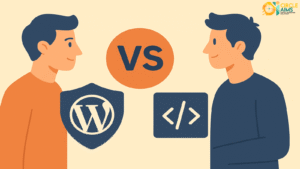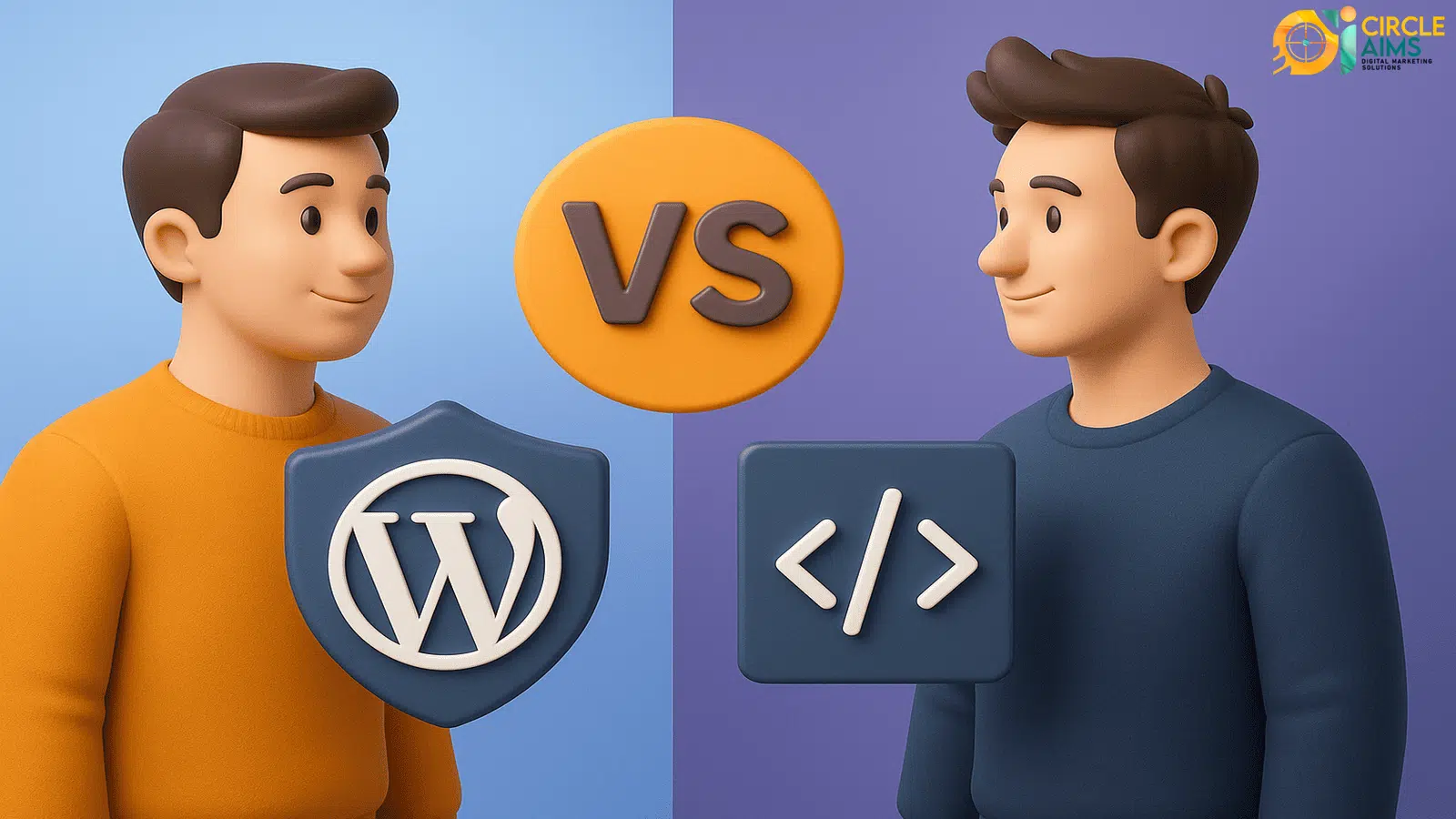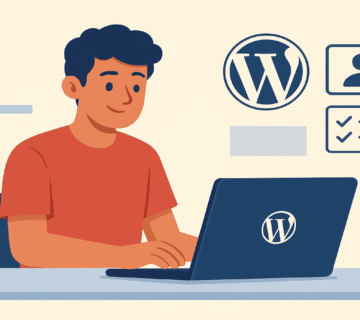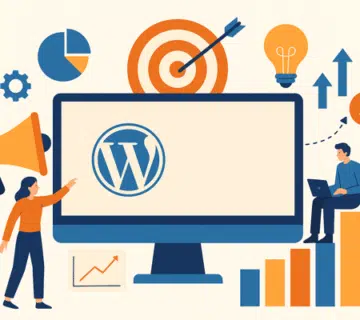WordPress vs custom programming
Which Is Best for Your Site?
Introduction
Choosing a Content Management System (CMS) or opting for custom website development is a complex decision that requires careful thought from project owners. These choices form a core part of a digital marketing strategy and aim to achieve business goals efficiently. In this context, WordPress is one of the most popular and widely used CMS platforms worldwide, while custom development represents a tailored approach that demands more resources but offers great flexibility.
WordPress stands out for its easy-to-use interface: anyone with basic IT knowledge can create a site and publish content without needing programming expertise. A wide range of themes and plugins enables users to customize their sites to meet their specific needs. On the other hand, custom development means building a site tailored to particular requirements, giving companies greater control over design and functionality. However, this option typically requires greater investment of both time and budget.
The key is understanding your project’s requirements and goals. The convenience and ease of WordPress may be ideal for small businesses or startups, whereas larger companies may need the additional customization and advanced functionality that WordPress can’t effectively cover. Therefore, making an informed decision about what’s best for your site depends on a thorough assessment of your project’s nature, budget, and technical needs.

WordPress vs. Custom Development
WordPress: An Overview
WordPress is one of the most popular and widely used content management systems in the world. Founded in 2003, it has emerged as a preferred choice for building and developing websites—from personal blogs to large commercial sites and online stores. Its success is attributed to a set of unique features that make it both user-friendly and flexible.
Among its standout advantages is an intuitive interface that lets users—even those without technical expertise—create and edit content easily. Likewise, WordPress provides a wide array of themes and designs that allow tailoring the site to match a brand or message. In addition, WordPress supports adding numerous features through plugins, enabling users to expand their site’s functionality as needed without writing any code.
WordPress’s popularity goes beyond ease of use: it powers more than 40% of all websites on the internet, making it a recognized and trusted platform. This broad adoption also means a large community of developers and users, which makes finding help and support easier when needed. Many companies and individuals use it thanks to comparatively low setup and maintenance costs versus custom development. These advantages make WordPress an attractive option for many project owners seeking to launch a website quickly and efficiently.
Custom Development: Concept and Benefits
Custom development is a technical solution aimed at creating applications or websites based on bespoke programming tailored to specific needs. Unlike CMSs such as WordPress that provide ready-to-use templates and tools, custom software lets developers write unique code to precisely match client and application requirements. With this approach, interfaces and functionality can be designed according to the organization’s needs, offering a direct response to evolving business demands.
One of custom development’s key benefits is complete flexibility. Instead of relying on limited, pre-made templates, developers can build solutions that enable unique features and bespoke workflows. This flexibility is especially useful for companies that need capabilities not available in off-the-shelf systems. For example, if you require integrations with specific systems or complex workflow management, custom development is often the best choice, as it can be built to fit your current environment.
Moreover, custom development can offer greater security compared to generic systems. Purpose-built software can reduce the security vulnerabilities that may accompany open-source platforms like WordPress. Custom software can incorporate enhanced security measures, making sites or apps less susceptible to cyberattacks.
Overall, custom development stands out as a distinctive option worth considering when building a tailored website, providing unique features and flexibility that surpass what popular CMSs typically offer.
Ease of Use
Ease of use is a fundamental factor when choosing the right system to build a website. In this regard, WordPress is a popular choice among beginners due to its simple, straightforward interface. Its flexible dashboard enables users—even without technical experience—to create and edit content easily. Pages, posts, and images can be added with just a few clicks, making site building and editing efficient and fast.
By contrast, things become more complex with custom development. Building a site from scratch requires more time to understand the code and languages used, such as HTML, CSS, and JavaScript. While custom development gives people complete control over design and functionality, that flexibility comes with challenges in the time and effort needed to learn and implement. It can be demanding for beginners and may create barriers for project owners wanting to launch quickly.
Additionally, WordPress provides a vast number of plugins and themes that let users tailor their sites to their needs. Beginners can use these tools without complex programming knowledge, helping them reach desired results faster. In contrast, the deep customization offered by custom development requires a high skill level. Thus, WordPress is generally easier for those without a technical background, enabling them to build functional, attractive sites more readily.
Costs
Website costs vary depending on whether you choose WordPress or custom development. If you opt for WordPress, several financial factors come into play. Typically these include WordPress hosting fees, which can range from $5 to $30 per month, depending on the provider and desired performance/support levels. You’ll also want to consider theme costs, which can range from free to $100 or more for premium themes. Add to that the cost of plugins you may need—anywhere from $10 to $500+, depending on the features you want.
On the other hand, custom development requires a larger investment because you’ll need to hire a developer or an agency. Rates vary greatly by experience and location, often ranging from $25 to $150 per hour. Building a bespoke site can take weeks to months depending on complexity and requirements, which can bring total costs into the thousands of dollars. You’ll also need ongoing maintenance and updates, adding to long-term expenses.
When deciding between WordPress and custom development, evaluate your budget carefully and think about future needs to ensure you choose an option aligned with your financial expectations and development process.
Performance and Scalability
Performance and scalability are among the most important considerations when choosing between WordPress and custom development. Each option has advantages and drawbacks that impact site speed and its ability to handle more visitors.
With WordPress, you get significant customization flexibility and access to a wide range of plugins. However, WordPress performance depends heavily on your hosting quality and the plugins you use. If these components aren’t well chosen or configured, site speed and overall efficiency can suffer.
That said, WordPress is designed for smooth scaling thanks to its flexible structure, which can accommodate large amounts of content. Still, maintaining consistent performance with very high visitor volumes—especially at traffic peaks—requires careful optimization.
Custom development offers clear performance benefits. Developers can optimize code to suit the site’s specific requirements, improving speed and strengthening security. With a custom build, you can create a unique architecture that adapts smoothly to business needs, enabling scalability without hurting performance.
However, custom development typically requires more time and money and may require periodic reassessment if visitor numbers or requirements change significantly.
In general, it depends on your site’s specific needs. If speed and security are top priorities, weigh the pros and cons of both options against your future goals and scalability needs.

Storage and Content
When comparing WordPress with custom development, content management is a core feature to consider. Each offers different mechanisms for storing and organizing information, which affects how you manage it. WordPress relies on an integrated CMS using a MySQL database to store text, images, and videos. Users can manage content easily through a graphical interface, making updates and additions straightforward.
Furthermore, WordPress provides numerous plugins to help organize content and improve how information is presented. Users can leverage categories, tags, and static pages to structure content effectively. These features enhance the ability to deliver rich, varied content aligned with their needs.
Custom development, meanwhile, gives greater flexibility in database design and content storage tailored precisely to project requirements. Developers can customize the database to reflect the desired structure and streamline uploading images and videos without constraints. However, this approach demands high skills and programming experience to ensure effective content management.
In short, the best choice depends on your site’s size and complexity, as well as specific business requirements. WordPress offers a quick, easy solution via a simple interface, while custom development helps create a more tailored experience to meet specific needs. Understanding how storage choices affect content management is essential to making the right decision for your site.
Support and Updates
Support and updates are essential factors when choosing a CMS for your site. Here we can compare WordPress and custom development in terms of community support and ongoing maintenance.
WordPress provides a vast community of users and developers supporting thousands of themes and plugins. This large ecosystem can help solve many issues you may encounter via forums and specialized sites. Moreover, WordPress offers regular updates that improve security and performance, enhancing user experience. These updates fix bugs and introduce new features, meaning that relying on WordPress gives you continuous improvements without needing a permanent developer on retainer.
By contrast, developing a site with custom code requires a larger investment in human and financial resources. Support and updates are more complex here: you’ll need contracts with the company or developers who built the site. If changes are needed, it may take more time and involve additional costs—especially for security-related fixes or feature enhancements. As a result, support can be limited, and you may lack immediate, automatic updates like you get with WordPress.
In conclusion, the availability of support and updates for both WordPress and custom development is a critical factor to weigh when deciding which approach suits your site. Narrow your options based on your current and future business needs.
Conclusion: Which Is Right for You?
When choosing between WordPress and custom development for your site, consider several factors tied to your needs and goals. Both options have strengths and weaknesses, so evaluate each in the context of your specific project.
WordPress’s key advantages are ease of use and speed to launch. It offers a wide range of themes and plugins that let you design an attractive site without advanced programming skills. It’s ideal for beginners or anyone looking to get online quickly. WordPress also benefits from an active support community, which makes finding solutions to issues relatively easy.
Custom development provides greater flexibility for deep customization, allowing you to design a unique experience that may be hard to achieve with ready-made platforms. If your project has special requirements or features that WordPress doesn’t offer, custom development may be the better choice. However, be prepared to invest time and resources for development and maintenance, as a tailored site often costs much more than using WordPress.
Ultimately, the best choice depends on your goals, budget, and technical skill level. If you want a fast, cost-effective solution, WordPress is the optimal choice. If you aim for an innovative site that highlights your identity in a truly unique way, it may be better to invest in custom development. Evaluate your options carefully and select the path that aligns with your long-term vision.






No comment